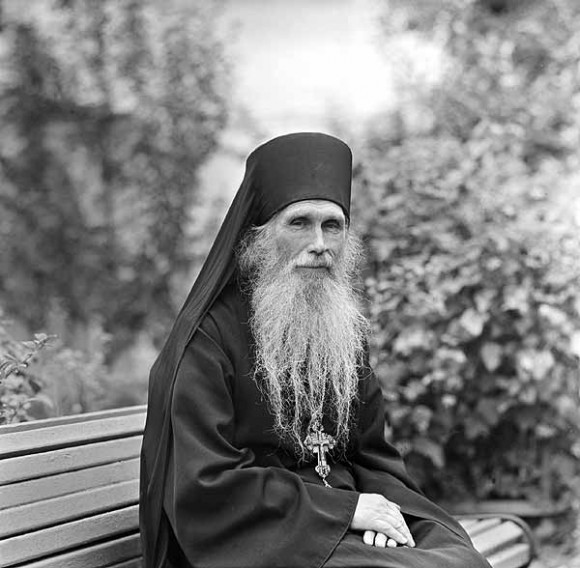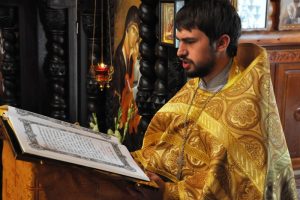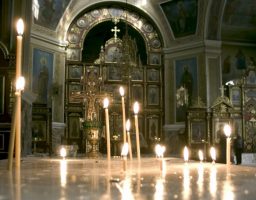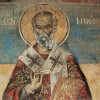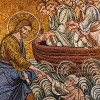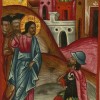In the Name of the Father, and of the Son, and of the Holy Spirit!
Beloved brothers and sisters, you have done a good thing by coming to church today, gathering to offer up together our fervent prayer to the Throne of God for our departed fathers, brothers, sisters, and for all our kinsmen and all departed Orthodox Christians. It is the duty of love towards our neighbors that requires us to pray for the departed who have passed on to eternity. Their fate is unknown to us, but we must certainly pray for them, because it is very good for them and very beneficial to us. By praying for the reposed, we thereby testify to our love for our neighbors and express compassion and mercy. As the Lord said: Blessed are the merciful: for they shall obtain mercy (Matthew 5:7). Moreover, if the neighbor for whom we are praying has pleased the Lord, then he himself already has the boldness before the Lord to offer up his prayers to Him for us.
The Church received the custom of praying for the reposed from the Apostles themselves; it has always prayed for them, and will continue to pray for them until the end of time. St. John Chrysostom wrote: “Not in vain was it decreed by the Apostles that in the awesome Mysteries remembrance should be made of the departed. They knew that there was much gain for them, much benefit” [Homilies on Philippians 3:9-10]. The Holy Fathers and teachers of the Church of all times preached in the hearing of all that the lot of the reposed can be changed before the universal Judgment.
St. John Chrysostom writes the following concerning the departed sinner: “For it is, yes, it is possible, if we will, to mitigate his punishment, if we make continual prayers for him, if for him we give alms. However unworthy he may be, God will yield to our importunity” [Homilies on the Acts of the Apostles 21.4].
In the Blessed Augustine we read: “There is no denying that the souls of the dead find relief through the piety of their friends and relatives who are still alive, when the sacrifice to the Mediator is offered for them, or when alms are given in the church. But these things are of profit to those who, when they were alive, merited that they might afterward be able to be helped by these things. There is a certain manner of living, neither so good that there is no need of these helps after death, nor yet so wicked that these helps are of no avail after death” [Handbook on Faith, Hope, and Charity 29:110].
There are many examples of how fervent prayer for the reposed has freed them from their painful condition. Let us cite one trustworthy example, written by Perpetua, a holy woman martyr of the third century:
“A few days after, while we were all praying, suddenly in the midst of the prayer I uttered a word and named Dinocrates; and I was amazed because he had never come into my mind save then; and I sorrowed, remembering his fate. And straightway I knew that I was worthy, and that I ought to ask for him. And I began to pray for him long, and to groan unto the Lord. Immediately the same night, this was shown me.
“I beheld Dinocrates coming forth from a dark place, where were many others also; being both hot and thirsty, his raiment foul, his color pale; and the wound on his face which he had when he died. This Dinocrates had been my brother in the flesh, seven years old, who being diseased with ulcers of the face had come to a horrible death, so that his death was abominated of all men. For him therefore I had made my prayer; and between him and me was a great gulf, so that either might not go to the other. There was moreover, in the same place where Dinocrates was, a font full of water, having its edge higher than was the boy’s stature; and Dinocrates stretched up as though to drink. I was sorry that the font had water in it, and yet for the height of the edge he might not drink.
“And I awoke, and I knew that my brother was in travail. Yet I was confident I should ease his travail; and I prayed for him every day till we passed over into the camp prison. (For it was in the camp games that we were to fight; and the time was the feast of the Emperor Geta’s birthday.) And I prayed for him day and night with groans and tears, that he might be given me.
“On the day when we abode in the stocks, this was shown me. I saw that place which I had before seen, and Dinocrates clean of body, finely clothed, in comfort; and the font I had seen before, the edge of it being drawn to the boy’s navel; and he drew water thence which flowed without ceasing. And on the edge was a golden cup full of water; and Dinocrates came up and began to drink therefrom; which cup failed not. And being satisfied he departed away from the water and began to play as children will, joyfully. And I awoke. Then I understood that he was translated from his pains” [The Passion of Saints Perpetua and Felicity, 7-8].
The Blessed Augustine, in his explanation of this account [in On the Soul and its Origin], says that Dinocrates was illumined by Holy Baptism but, under the influence of his pagan father’s example, was weak in faith and died after several falls into sins typical of his age. For such infidelity to the holy faith he suffered torment, from which he was delivered through the prayers of his holy sister.
Therefore, my dear ones, as long as the Church militant remains on earth, by its aid the lot of departed sinners can still change for the better. How much consolation is there for the afflicted heart, how much light for the perplexed mind is there in Christianity! Rays of light also pour therefrom into the somber realm of the dead.
Dear brothers and sisters, the Savior’s good grace has granted us the means to improve the lot of our departed brethren. Let us therefore not be inattentive to the will of heavenly good grace; let us not be cruel to our neighbors. Let us do everything we can for them; let us pray for them with the prayers of the Holy Church; let us give alms for them. If not to them, then at least be merciful to yourselves. For will the Lord be merciful to us if we have not been merciful to those whom he has redeemed by His Blood? Will we remain true Christians if we have not performed deeds of love?
Performing the commemoration of the reposed, we should always remember that we, too, will follow them into that other, eternal life – if not today, then tomorrow. Man does not utterly vanish, because he has an immortal soul that does not die. That which we see dying is the visible, coarse body; but a fine power normally called the soul lives therein.
The body itself testifies to its mortality, because it is perishable and divisible; while the soul, on the contrary, has a simple, spiritual, indestructible essence and cannot, like the body, decompose into its constituent parts and die. The soul is immortal. The soul has an indivisible and unconfused unity; throughout all of life it perceives only continual being. Our bodies participate in life as though unwillingly, being driven to action by the soul’s power, and are always burdened by their sloth. The soul, however, always continues its independent life and activity, even when the body’s activity is halted by sleep, illness, or death. Belief in the immortality of the soul existed in all nations and at all times, even among pagans and savage tribes.
What serves as evidence for the immortality of our souls? First of all, the word of God assures us that the human soul is immortal. Even in the times of the Old Testament, the Ecclesiast said: Then shall the dust return to the earth as it was: and the spirit shall return unto God Who gave it (Ecclesiastes 12:7). And in another place, the wise one says: For God created man to be immortal, and made him to be an image of His own eternity (Wisdom 2:23 [LXX]). God allowed Job to be tempted only through his body and property, but did not allow the evil one to touch his soul. The entire New Testament is a confirmation of our faith in the immortality of the soul and our hope for the future Resurrection. The Lord Jesus Christ confirmed this faith and hope by word and deed when He said that He had come into the world so that whosoever believeth in Him should not perish, but have eternal life (John 3:15); He also said: Verily, verily, I say unto you, If a man keep My sayings, he shall never see death (John 8:51).
The Lord commands all Christians, and especially preachers of the word of God: fear not them which kill the body, but are not able to kill the soul: but rather fear him which is able to destroy both soul and body in hell (Matthew 10:28). The Lord thereby clearly stated that the soul is immortal. The Apostle Paul likewise writes: For we know that if our earthly house of this tabernacle were dissolved, we have a building of God, an house not made with hands, eternal in the heavens (2 Corinthians 5:1).
One’s own common sense should recognize the truth of the human soul’s immortality. Look closely at man: for what does his heart seek, to what does it aspire? Why does nothing in this world fill or satisfy his soul? One person has every imaginable pleasure on earth, but nonetheless still looks for something without finding it. Another vainly imagined he could quench his soul’s thirst with worldly pleasures and amusements, but all this leaves nothing but emptiness of soul and weariness of spirit; he looks again for new pleasures, but again finds no delight therein.
This all demonstrates that nothing in this world can satisfy the human soul’s inner thirst for blessedness. It is for this very reason that God awoke such an unquenchable thirst in the human soul, to show another, better life to him, so that man would not dwell on temporal pleasures, but rather strive to honor the higher calling of God.
What if we turn our attention to our soul’s capacity for knowledge? How vast is the range of human knowledge; how vast is the store of objects the memory contains; what an infinite expanse runs through the imagination in a single moment; what elevated objects does reason perceive and explain! The vaster man’s range of knowledge, the greater his soul’s thirst for acquiring it is aroused. What does this utterly unquenchable thirst for knowledge indicate, if not that the soul will attain full satiety of knowledge only beyond the grave?
If one turns one’s attention to man’s very life, then one can find therein vital evidence for the immortality of the human soul. In what condition does man spent the greater part of his life? Is it not in sorrow and affliction? One person struggles with illness, another with unhappiness, another suffers from poverty and deprivation, while another bears the ill will of his enemies or endures trouble from their envy and slander. It would be difficult to find anyone unfamiliar with unhappiness, one that could say that he is happy and blessed. How many such suffering people there are, people who have met with sorrow and illness from the very cradle, people who will not leave them behind until they reach the grave! How can one explain the goal of human existence once one has deprived the soul of immortality? Could the lot of dumb animals and men be one and the same? In what way, then, is man superior to them? Is it only that he endures greater sorrow and unhappiness? But the word of God resolves this confusion when it says: when our earthly house is dissolved, we have a building of God, an house not made with hands, eternal in the heavens. Amen.
Translated from Russian.












